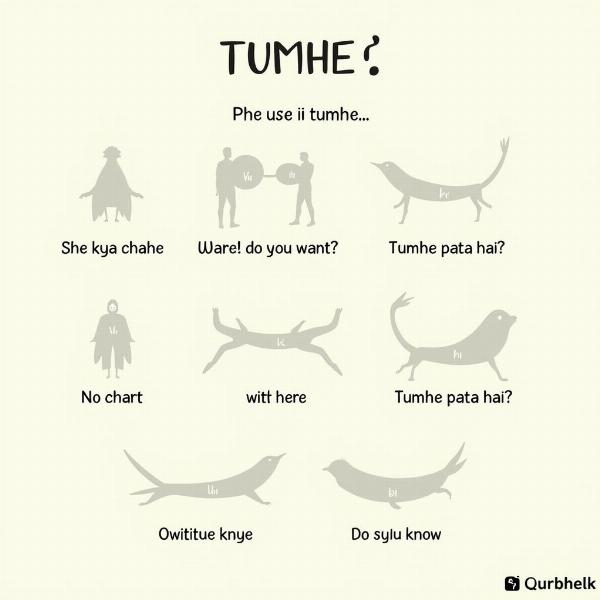Understanding the meaning of “tumhe” in Hindi is crucial for anyone learning the language. “Tumhe” translates to “you” in English, but its usage carries more nuance than a simple direct translation. It’s essential to grasp these subtleties to communicate effectively and respectfully in Hindi. Knowing when and how to use “tumhe” correctly will significantly enhance your understanding of Hindi grammar and social etiquette.
Decoding the Meaning of “Tumhe”
“Tumhe” is the oblique case of the pronoun “tum,” which also means “you.” The oblique case is used when the pronoun is the object of a verb or preposition. So, while “tum” is the subject form (like “you” in “You are going”), “tumhe” is the object form (like “you” in “I see you”). This distinction is key to using “tumhe” correctly. For example, “Main tumhe dekhta hoon” (मैं तुम्हें देखता हूँ) translates to “I see you.” Here, “tumhe” is the object of the verb “dekhta hoon” (see).
Formal vs. Informal “You”: Navigating the Pronoun System
Hindi has several words for “you,” reflecting the language’s emphasis on social hierarchy and respect. “Tum” and its oblique form “tumhe” are considered informal and are generally used with friends, family members of the same age or younger, and people you know well. Using “tumhe” with someone you don’t know well or someone older than you could be considered disrespectful. In formal situations, “aapko” (आपको), the respectful form of “you,” is preferred. For example, “Main aapko dekhta hoon” (मैं आपको देखता हूँ) means “I see you” but with a respectful connotation.
Common Phrases Using “Tumhe”
Understanding “tumhe” also involves knowing common phrases in which it appears. Phrases like “Tumhe kya chahiye?” (तुम्हें क्या चाहिए?) meaning “What do you want?” or “Tumhe pata hai?” (तुम्हें पता है?) meaning “Do you know?” are frequently used in everyday conversation. These phrases demonstrate the practical application of “tumhe” in forming questions and expressing common inquiries.
 Common Phrases with Tumhe
Common Phrases with Tumhe
Tumhe vs. Tujhe: A Deeper Dive into Informality
While “tumhe” is informal, Hindi offers an even more informal “you”: “tujhe” (तुझे). “Tujhe” is typically used with very close friends, family members significantly younger than you, or in situations of extreme intimacy. Using “tujhe” with someone who doesn’t warrant that level of informality can be perceived as rude or condescending. Therefore, understanding the nuances between “tumhe” and “tujhe” is crucial for appropriate communication.
Why is Understanding “Tumhe” Important?
Mastering the use of “tumhe” is more than just grammar; it’s about understanding Indian culture and social dynamics. Using the correct pronoun demonstrates respect and awareness of social hierarchies, fostering positive communication and avoiding unintentional offense. Proper usage of “tumhe” enhances your ability to connect with Hindi speakers on a deeper level.
Conclusion
“Tumhe” is a seemingly simple word, but its usage carries significant cultural and grammatical weight. By understanding its nuances and the context in which it’s used, you can navigate Hindi conversations with greater confidence and respect. Remember, choosing the correct pronoun is essential for effective and culturally sensitive communication. So, the next time you want to say “you” in Hindi, consider the context and choose wisely between “tumhe,” “aapko,” or “tujhe.”
FAQ
-
When should I use “tumhe” instead of “aapko”? Use “tumhe” with friends, family of the same age or younger, and people you know well. Use “aapko” in formal settings and with elders or people you don’t know well.
-
Is “tujhe” more respectful than “tumhe”? No, “tujhe” is even more informal than “tumhe” and should only be used with very close friends or family significantly younger than you.
-
Can I use “tumhe” with anyone? While grammatically correct, using “tumhe” with someone who deserves more formal address can be disrespectful.
-
What happens if I use the wrong pronoun? Using the wrong pronoun can cause offense or create an awkward situation. It’s always best to err on the side of formality.
-
How can I learn more about Hindi pronouns? Numerous online resources, textbooks, and language learning apps can help you further explore the nuances of Hindi pronouns.
Further Exploration: Related Articles
Meaning-Hindi.in is your trusted partner for all your Hindi translation needs. We specialize in business, legal, technical, website, educational, and specialized translations, offering fast and accurate services to bridge the language gap. Whether you need to translate documents, legal contracts, technical manuals, or website content, our team of expert Hindi linguists is here to assist you. Contact us today at [email protected] or call us at +91 11-4502-7584. Meaning-Hindi.in is committed to delivering high-quality translations that meet your specific requirements.